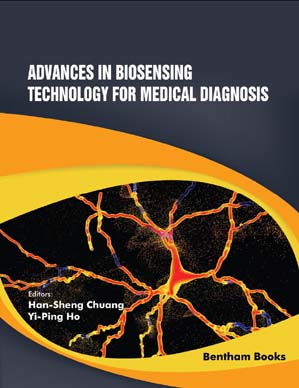Abstract
Electrochemical biosensors combine a molecular recognition concept involving the use of biosensors to sensitively detect target analytes with an attractive electrochemistry technique to analyze a biological sample due to the direct conversion of a biological event to an electronic signal. The strength of electrochemical biosensors allows sensitive, label-free biosensing with highly temporal resolution using a miniature instrument. This chapter commences with a fundamental introduction of the electrochemical principles, as well as providing a technological comparison between general voltammetric measurements, including cyclic voltammetry (CV), differential pulse voltammetry (DPV), and square wave voltammetry (SWV). It continues with a broad, detailed description of various electrochemical applications ranging over ionselective electrodes, an enzyme-catalyzed / non-enzymatic glucose sensor, an aptamerbased biosensor (aptasensor), and a genosensor for nucleic acids. This chapter provides readers with a good insight into the usefulness, performance, and properties of electrochemical biosensors with many examples.
Keywords: Aptamer, Electrochemical sensors, Genosensor, Glucose sensor, Ionselective electrodes.


















